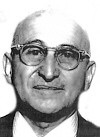Beno Gutenberg

Beno Gutenberg was born in Darmstadt, Germany, on 4 June 1889; he studied geophysics, physics and mathematics in Darmstadt and later in Göttingen, where he received his Dr.Phil. in 1911. In 1911/12, while working at the Geophysical Institute of the University of Göttingen, he identified the Earth's core and determined the core-mantle boundary of the Earth at a depth of 2890 km from seismic data.
After his engagement with the Central Bureau of the International Seismological Association in Strasbourg and with the soap factory of his father in Darmstadt, Beno Gutenberg received his venia legendi and a professorship at the University of Frankfurt in 1926. In 1929 he got an offer from Robert Millikan for full professorship in seismology at the California Institute of Technology in Pasadena. In June, 1930, Beno Gutenberg accepted this invitation and became director of the seismological laboratory in 1947. During World War 2 Beno Gutenberg served as an adviser for the US Navy and, in 1951, for UNESCO. He was also President of the Seismological Society of America (1945-1947) and of the International Seismological Association (1951-1954), which was re-named under his presidency to "International Association of Seismology and Physics of the Earth's Interior (IASPEI)". In 1957, Beno Gutenberg handed the directorship of the seismological laboratory over to Frank Press and, in 1959, he became a professor emeritus of the California Institute of Technology. Beno Gutenberg died on 25 January 1960 in Pasadena.
